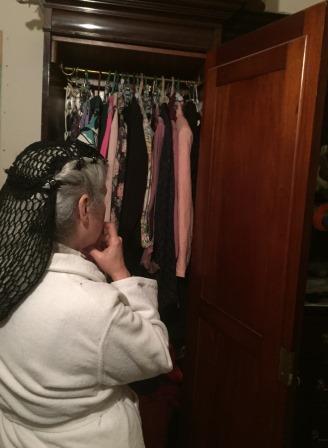
Tru is frozen with decision by choices in her wardrobe.
Guest article by Truthful Loving Kindness
Tru here. Changes are happening in America’s dementia communities. The Alzheimer’s Association and the National Institute on Aging have expanded the definition of Mild Cognitive Impairment (MCI).
In the past three months, five friends and I have seen specialists and returned with the new MCI diagnosis. Some thought MCI would be an initial and temporary diagnosis until the source of cognitive impairment was identified. However, several of my friends have received diagnoses that include MCI, such as MCI with underlying Lewy Body Dementia, Alzheimer’s, or Fronto-Temporal Dementia.
I understand this change is due to a relabeling of symptoms, which were included under the umbrella of dementia.
Study results stated in “Revised Criteria for Mild Cognitive Impairment May Compromise the Diagnosis of Alzheimer Disease Dementia”:
“Almost all (99.8%) of individuals currently diagnosed with very mild AD dementia and the large majority (92.7%) of those diagnosed with mild AD dementia could be reclassified as MCI with the revised criteria, based on their level of impairment in the Clinical Dementia Rating domains for performance of instrumental activities of daily living in the community and at home. Large percentages of these AD dementia individuals also meet the revised “functional independence” criterion for MCI as measured by the Functional Assessment Questionnaire.”
Angela Lunde of the Mayo Clinic’s Alzheimer’s Disease Research Center wrote [11/24/2017: Original link broken – removed]:
“… it’s good to try and sort out the confusion among the terms mild cognitive impairment (MCI), dementia and Alzheimer’s… The terms are often used interchangeably and can have varying interpretations even by healthcare professionals… it gets confusing… because the lines between normal age-related memory loss and mild cognitive impairment are blurred and overlap, as are the lines between MCI and early stage dementia caused by Alzheimer’s.”
From the Mayo Clinic:

Trying to make sense of cooking.
Dementia
- “Difficulty communicating or finding words”
- “Difficulty with complex tasks”
- “Difficulty with planning and organizing”
- “Difficulty with coordination and motor functions”
- “Problems with disorientation, such as getting lost”
MCI
- “You forget things more often”
- “You forget important events such as appointments or social engagements”
- “You lose your train of thought or the thread of conversations, books or movies”
- “You feel increasingly overwhelmed by making decisions, planning steps to accomplish a task or interpreting instructions.”
- “You start to have trouble finding your way around familiar environments”
- “You become more impulsive or show increasingly poor judgment.”
I believe the differences are very slight and far from objective measures. No wonder I hear of inter-facility conflict over which diagnosis best suits an individual.
For us in the U.S., this change of words from dementia to MCI prevents membership in some communities.
Some of my friends have kept their change of diagnosis private, as they do not want to lose their sense of belonging in select “dementia” communities. Nothing has changed, just the label. Our symptoms either remain the same or are intensifying. Yet, those of us who have gone public with our new MCI diagnosis are now getting the feeling “You don’t belong here.” We’re losing the closeness we once felt among others with dementia.
The relabeling from dementia to MCI has divided the dementia community.
We’re being marginalized among those called to serve as spokespersons advocating for dementia awareness.
More significantly, the change in terminology will likely affect our qualification for Social Security disability benefits. Why visit a specialist for an updated diagnosis if we’re to lose our benefits?
Many of us find it an exhausting ordeal just getting dressed in the morning and coordinating breakfast. How could we ever compete in an already tightly competitive job market?
As we try to raise awareness in order to reduce the stigma of dementia, we have a new challenge ahead — to raise awareness of the potential for damage caused by this change to MCI. While health care costs continue to rise, many of us living with dementia symptoms will be stigmatized by our government (lose benefits) due to this new diagnosis of MCI.
 Truthful Loving Kindness changed her name in 2007 to remind herself and others of this (TLK or as she writes, Tru) as goal. Wife and mother of four, grandmother of two, she writes and speaks to help bring awareness of dementia issues. She compiled Dementia Success Stories, which are accessible online.
Truthful Loving Kindness changed her name in 2007 to remind herself and others of this (TLK or as she writes, Tru) as goal. Wife and mother of four, grandmother of two, she writes and speaks to help bring awareness of dementia issues. She compiled Dementia Success Stories, which are accessible online.
This article has been edited and abridged. Tru explains that her university-level comprehension has declined to a 4th grade reading level. It takes more words for her to express what she is trying to say. To read her unedited articles on her website, click on her name above.
Additional information re: Alzheimer’s and MCI
- New Criteria May Change Alzheimer’s Diagnosis
New diagnostic criteria would reclassify nearly all cases of very mild Alzheimer’s dementia as mild cognitive impairment. Why that may not be a good idea. - FREQUENTLY ASKED QUESTIONS -Publication of New Criteria and Guidelines for Alzheimer’s Disease Diagnosis
- Alzheimer’s Association website: What is Dementia? – Mild Cognitive Impairment
[TCV Update 6/27/2018: Alzheimer’s Association URLs for items 2 and 3 are no longer available – using links to archived copies.]









Thank you for your response, Brenda. Yes, you are correct….there are a number of health/cognitive issues under the label of MCI than can be corrected or are reversible.
I am not the individual represented in my post above. I do have a confirmed early onset Alz diagnosis. I thought my memory lapse was the result of me getting older (55 at diagnosis) and being too busy in my career.
At first, my neurologist (an Alz research specialist and chair of neurology at his medical campus) gave me a ‘label’ of MCI, until he tested and ruled out the other causes of cognitive issues under the umbrella of MCI. After those tests were all negative and my brain MRI results reviewed….I was officially diagnosed with Alz. I never once felt that my care was being compromised by a need to reduce healthcare costs.
To your point of having been diagnosed with dementia and then having it reclassified or even removed entirely…..I think any one of us who are truthfully and honestly living with dementia would be thrilled to find out ‘it was all a dream’ and we could wake up now! Who on earth would WANT this?! We are not going to be re-classified, even if continued cognitive testing shows a mild progression or decline.
I am not saying there are not difficult cases to diagnose and occasionally, it may take the cognitive symptoms a few years to progress to the point where dementia can be determined or measured. It does not take 3-12 years to get a dementia diagnosis if the disease is truly there as your guest blogger has previously indicated is their experience.
To your point of…… “fear involved in having lived with a diagnosis of dementia–whether psychological or not–the fear experienced by the person is real”…..that’s my point….the person doesn’t have dementia. If it’s ‘real’ to them, (but bona fide testing does not provide that diagnosis) they need a psychiatrist to help them sort out their issues. All of us with confirmed diagnoses would be better served if this person was spending their time getting healed; not pursuing self-serving dishonest agendas and representing themselves as an ‘expert in dementia and dementia symptoms.” to a demographic of fragile, vulnerable, truly diagnosed individuals.
There are some well-educated, formerly high performing individuals who are now living with confirmed diagnosis of dementia. They have much more reality and truthfulness to contribute as a guest to your blog.
Thank YOU, Rose for adding more information to your earlier comment.
And I agree wholeheartedly, that a lesser diagnosis would be good news… providing that the symptoms warrant it.
And as you mention there are those cases that take time to manifest.
However, a related fact is that each country will create policy around rising incidents of dementia diagnoses and the concern in the U.S. is that, it may harm people’s benefit eligibility.
As to your remark addressing the author’s status of dementia diagnosis, I am not in a position to make that determination.
I rely on the goodwill of people with dementia around the world to share their voices in an effort to raise awareness.
Twenty years ago, when I began serving people with dementia and their families, less than a handful of people’s voices with dementia were heard.
Today, we are gifted with members from organizations like DAI who are willing to gather and speak about their experiences in order to increase all of our understanding of what it’s like, as the late Dr. Richard Taylor would say (and I paraphrase), living with Alzheimer’s from the Inside Out.
I do welcome your participation, Rose, and/or those you describe in your last paragraph.
After all, we’re all journeying many roads–some filled with potholes toward understanding and others with detours, until we reach a smoother paved road where stigma is replaced by compassion and understanding.
When is it MCI and when is it psychiatric?
What if…..
A long time ago, someone went to a local junior college taking courses in theatre arts/drama.
What if….some years later this person states they contracted Lyme disease…..reportedly with cognitive impairment/dementia symptoms. The person received treatment, and luckily for them, Lyme induced dementia is the only curable dementia.
What if….since disability benefits are impacted by the ‘cure’ and this person still wants a dementia diagnosis to retain benefits? They embark on an odyssey of finding a doctor who will support their self –diagnosis of dementia.
What if…..over a 3-12 year period, this person goes to Stanford..and after a full dementia work up Stanford says ….. the person does not have dementia.
What if….this person sends their medical records to Mayo Clinic requesting an evaluation for dementia but after Mayo reviews the person’s records, declines an appointment as said person’s symptoms do not meet Mayo’s criteria for dementia screening. (Translation: this person does not have dementia)
What if…. this person ingratiates themselves into on-line dementia support groups/blogs saying they have dementia, but are still waiting on a ‘confirmed’ diagnosis, thus skirting the issue full disclosure and truthfulness.
What if…… this person continues to push their dementia agenda, representing themselves as an ‘expert’ on living with dementia/dementia symptoms on an international platform, (those drama/theatre classes paid off), as well as blogs, videos and cut/paste newsletters.
What if….after the person’s membership is revoked in a dementia support group after several inquiries by group members about this person’s diagnosis, and a confirmed diagnosis of dementia cannot be provided…..this person re-invents their symptoms as Lewy Body Disease…again….self-diagnosis that cannot be proven.
And lastly,
What if…..all of the person’s ‘specialists’ cannot diagnose ‘dementia’ and the re-classification becomes MCI or Mild Cognitive Impairment.
MCI is NOT a diagnosis of dementia…..it is a symptom of ‘something’ going on in the body, but it doesn’t necessarily mean the prognosis is dementia. If someone has been seen by some major medical institutions in the course of a ten year period and dementia hasn’t diagnosed by now…..maybe the MCI label is psychiatric, not dementia.
I like your approach with What if, Rose.
To be clear there are other reversible causes of dementia beyond Lyme-induced dementia such as caused by alcohol and medications, among others.
I will add, however, what if a person has been living with dementia symptoms and functioning but also experiencing a decline in function only to still be reassessed and diagnosed as MCI as a step toward reducing healthcare costs?
As your what ifs imply, each must be evaluated on a case by case basis.
Sometimes, there’s fear involved in having lived with a diagnosis of dementia–whether psychological or not–the fear experienced by the person is real.
After all, imagine receiving such a diagnosis and then after living with it for years and trying to adjust your life, all of a sudden it is lifted. It will take time to adjust.
So, thank YOU, Rose, for helping us look at this more realistically and the implications that we may not consider at first glance.
Morning Brenda, the bottom line is they have no idea which is which and only take a guess.
This sounds like a play with words to reduce the help people get.
My wife was classified with Parkinson’s in 2004. In 2008 they changed it to Lewy Body Dementia with parkinsonism. Then 6 months later the Neurologist was not sure so said he doubted LBD.
What a play on words for the change to diagnosis what it really is.
Half of doctors that I know had no idea what Lewy Body Was so they just classified it as Dementia. (ER doctors have no clue)
So, it doesn’t surprise me that someone decides that they can tell the difference between “difficulty and you forget”! Just sounds like a line by someone to take benefits away from people.
I wish they could walk in our shoes. Gary’s latest book on caregiving maybe could educate these people of what all of us caregivers have gone through and are going through.
EXACTLY, Don. Thank YOU for taking time to share how the diagnoses keep changing.
One point I do make in Diagnosing Dementia too Early – A Double-Edged Sword is the challenge your beloved Marie had in receiving a more accurate diagnosis.
What you fail to mention is that there is a big difference between never getting a dementia diagnosis after years of trying, in fact being told you don’t have dementia by some doctors, and being reclassified to MCI Lewy Body or MCI Alzheimer’s which merely reflects their early stage of that dementia. If a doctor tells you have MCI but they don’t know why, it is proven through statistics that some of those people do not have a form of dementia. Their cognition has been affected by a different physical or mental disorder than dementia.
You raise important points, John–
1. The delay of getting a diagnosis vs. not getting one at all
2. MCI with underlying causes such as Alzheimer’s or Lewy bodies.
Yet, it’s an issue if one finds it difficult to function day to day regardless of the diagnosis.
Your 3rd point about the underlying cause may be due to something other than dementia is the reason it’s so important to receive a diagnosis from geriatric specialists. Regardless of one’s age, these professionals specialize in dementia-related diseases and can more accurately assess what is going on.
Still, the idea of people increasingly being diagnosed with MCI may pose an issue down the line with benefits eligibility… and this is where the uncertainty lies.
Great research Tru-This is an important topic right now because the change in diagnosis can often result in the reduction or limitation of social support services for those with MCI vs dementia.
Exactly, Paulan. That’s usually the way things work – rarely, the other way around. THANK YOU.